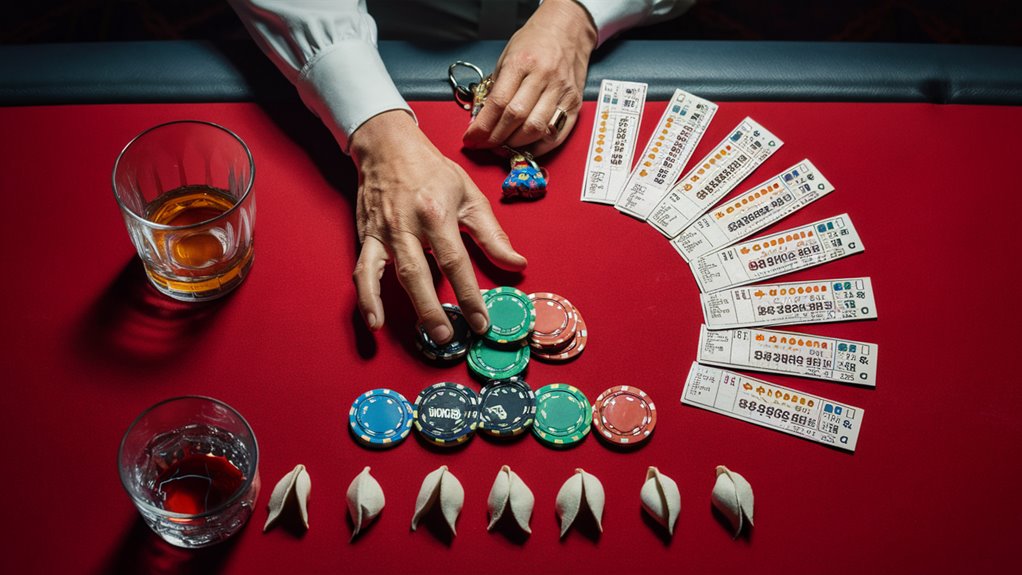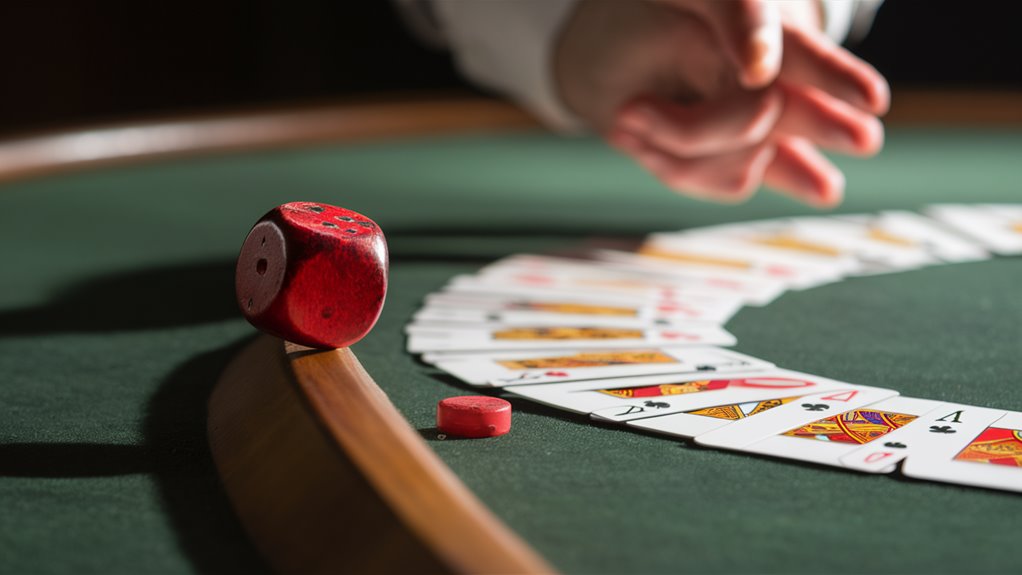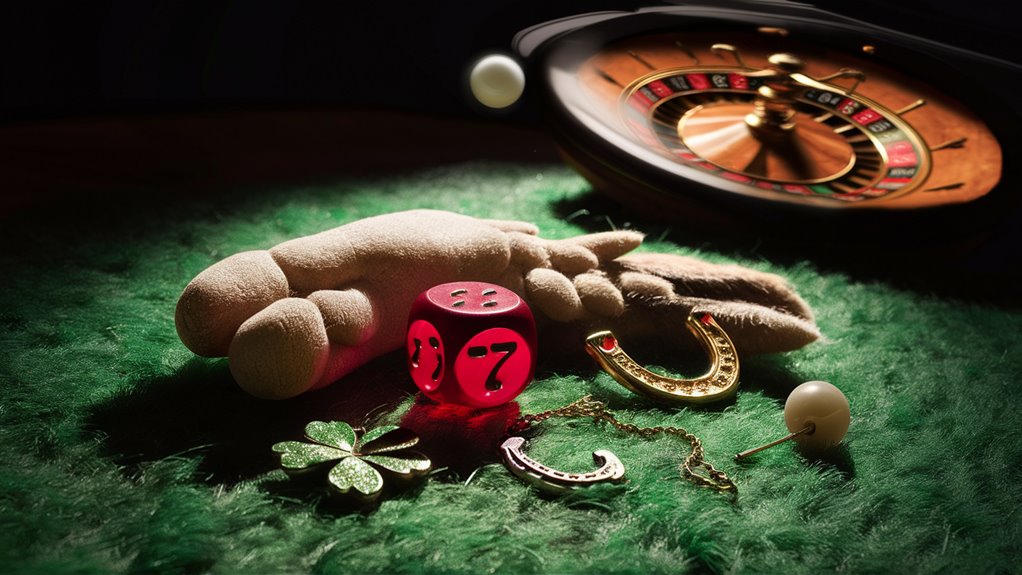Why Folks Believe Lucky Things Help Them Win

When folks bet and stick to lucky habits, they play a game in their mind. They might hold a lucky charm or act a certain way before they bet, thinking it will let them control things. Most times, it’s all in their mind, making them feel they rule over the game’s random events. 이 자료 참고하기
How the Brain Sees Luck
Some brain parts, like the ventromedial prefrontal cortex and nucleus accumbens, make gamblers feel luck is real. This feeling grows when they win due to these habits. At the same time, another part, the amygdala, can make them scared when they skip these rules.
Old Stories and Mind Games
Old tales play a big role in these gambling ways, coming from long-gone beliefs and habits. When players win, they think it’s because they kept to these habits. The brain loves to see links, so it quickly believes in these ties, even if they’re just by chance.
Getting Over Luck in Betting
Knowing how these mind tricks work is key to smarter betting. Seeing that the brain often makes fake ties can make players realize they aren’t really controlling the game with their habits or charms.
From Old Stories to Game Floors
Roots in Old Beliefs
Long ago, gambling was part of early peoples’ spirit lives, used in rites to try and see the future. These ceremonies slowly turned into luck games while keeping their mysterious feel.
Signs of these old games have been found in places like Egypt and Rome. The old games often used prayers for good luck, first done in temples before changing into what many now call gambling.
Luck Lives On
Even today, some old ways still linger, like blowing on dice or wearing certain colors thought to bring good luck. These create a kind of mind space where players feel both in charge and under fate’s wings, using old secrets to guide their games now.
- Temple rites
- Holy items in the old games
- Old ways of seeing the future
- Lucky acts
- Spirit and play in history
Many of these old parts keep shaping the casino world today and how games are played, showing how strong old beliefs are in today’s game world.
Lucky Charms and Winning
Casino Charms and Their Stories
In casinos today, good luck charms are everywhere, from rabbit feet to four-leaf clovers, each with its own tale.
The big ones include special coins, family jewelry, and clothes worn on past winning days.
How Culture Shapes Charms
Where folks come from shapes the charms they see as lucky. In many places in Asia, red things and jade charms are big for luck, while many in the West like horseshoes and lucky numbers.
This shows clearly in how they play, showing their lucky charms in how they bet.
Charms With Meaning
Most of all, charms that mean a lot to someone, like wedding rings or family keepsakes, are what you see most. Even though they make players feel better, they don’t change what comes in the game or the odds of winning.
- Red things and jade items
- Religious medals and crosses
- Family things with deep meaning
- Coins from big events
- Lucky clothes from good days
- Touching charms before betting
- Placing charms just right at tables
- Picking jewelry for casino visits
- Carrying many lucky items
- Keeping charms in order during games
Seeing Past the Luck Trick

Lucky Charms and Mind Games
Lucky charms and habits are part of a bigger mind game called the illusion of control. This makes players think they can change random chances with their moves, thoughts, or habits.
In casinos, you often see folks acting like they can control games, from how they throw dice to when they hit the button on slot machines.
Games Make Believe
This feeling of control shows up often in games where players get to pick or do something themselves.
Poker players show this by how they handle their cards or pick their seats, and roulette players feel more sure when they can drop the ball themselves. These moves make them think there’s a tie between what they do and what comes in the game.
How It Changes How We Gamble
Studies show that this trick of the mind keeps going even when it’s clear it’s not real.
This wrong thought can make players take risky bets and face troubles if they think they can beat the odds with a system. They end up taking more risks, which can lead to big troubles with gambling.
- Being part of the game
- Making up lucky moves
- Reading too much into what comes
- Thinking skill can change luck
World Betting Beliefs
Influence from the East
In many Eastern spots, numbers mean a lot in betting. For example, the number 8 is seen as very lucky, while 4 is not liked because it sounds like “death.” These deep beliefs change how casinos are set up and how games and bets are made all through Asian markets.
Western Betting Ways
In the West, personal habits and old lucky signs lead the way. Things like horseshoes, four-leaf clovers, and certain betting ways are big in the gambling scene here. You see this in game choices too, with blackjack and roulette being favorites.
Religion and Culture in Betting
How Islam Sees It
Religious rules have a big impact on betting around the world. Islam, for example, doesn’t allow gambling, leading to big changes in how betting is seen and done in different spots.
Native American Views
Native American betting mixes spiritual beliefs with today’s casino ways. Things like spirit animals and nature shape the look of casinos and the choice of games, mixing old beliefs with new game styles.
What People Play
Cultural ways set up different gaming identities through:
- Which games are picked
- Design and look of spots
- How and what people bet on
- Baccarat and sic bo being big in Asian spots
- Mixing rituals into games
- Thinking of nature in design
These cultural parts make betting worlds that reflect local beliefs, traditions, and values, shaping rich and varied global gambling scenes.
How The Mind Holds on to Luck
Brain Paths and Gambling Luck
Culture and luck ways deeply impact how we gamble by triggering certain brain parts.
When gamblers follow their lucky habits, the ventromedial prefrontal cortex lights up. This brain spot deals with expecting rewards and linking feelings, making strong brain paths that keep these luck beliefs going.
Dopamine and Keeping Up Habits
Dopamine, a key brain signal for reward, fuels these luck habits. When wins follow these habits, it sends a rush that builds strong links. This cements the belief that the rituals bring success, even when it’s all random.
Emotions and Fear
The amygdala, our brain’s spot for handling fear, also keeps these habits strong. When gamblers try to drop their rituals, this part fires up, making them worried and pulling them back to their beliefs. This shows why it’s hard to let go of lucky charms or moves, linking them deep in the brain as key to success, despite the true luck of the game.
Choices in Gambling
These brain ways loop back in our decision-making, making superstitions stick in how we think and act. The mix of dopamine rewards and fear from the amygdala builds a strong base in the brain, keeping these gambling behaviors going, hard to change despite clear odds and random facts.
Moving Past The Magic of Luck
Learn and Beat Gambling Superstitions
Changing ways of thinking is key to break free from thinking luck rules gambling.
By using solid, proven steps, people can drop these wrong thoughts that keep luck habits alive.
- Keeping a close watch on wins and losses helps fight the idea that “lucky” moves have real effects. Seeing that wins and losses just happen helps show the real random nature of gambling, proving that no habit or charm changes that.
- Learning more about chance maths helps keep thoughts clear, showing that game odds stay the same no matter what you do or believe. Songs Like a Pro
Mindful Choices and Smart Play
Using mindful ways helps when facing urges to follow luck during games. Watching these feelings without acting on them lessens their hold.
Shifting to thinking about strategy changes how you gamble, putting the focus on:
- Understanding game rules
- Checking chance with numbers
